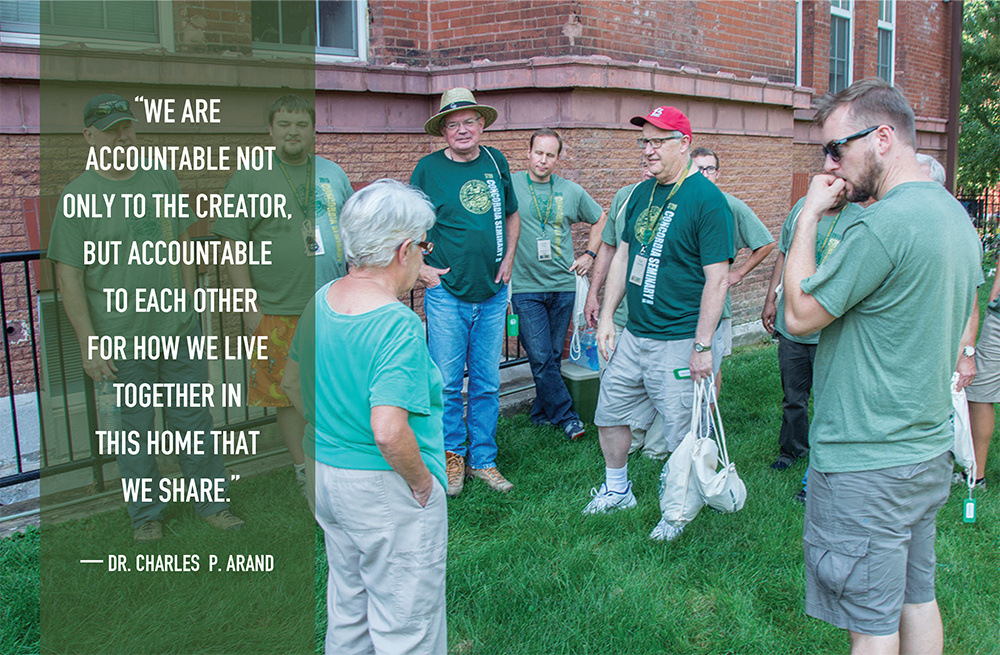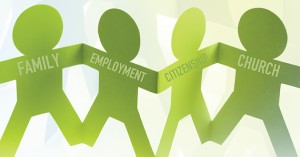
Concordia Seminary Newsroom
Being accountable in God’s household of creation

When “Noah” came out starring Russell Crowe, a number of Christians took issue with the movie for never mentioning the word “God.” Instead, Noah referred to God throughout the movie simply as the “Creator.” There is something both basic and profound about speaking of Jesus as both Creator and Redeemer. Not the least of which is the simple biblical truth that being the Creator of everything is what defines God as God throughout the Bible. But what does that mean for us?
A home for God’s creatures
Martin Luther asks the question in his Large Catechism, what does it mean to say that God is the maker of heaven and earth? He answers that it means, “I am a creature.” This may sound like such a basic statement that we need not belabor the point, but consider a few of the implications.
The Creator precedes us. He defines who and what we are. As a creature, I am not the Creator. I do not make God or define God. I do not decide what God should or should not do. God acts by His own counsel (Ps. 135:5-6). That means God is not answerable to us for what He does or does not do. It is we as creatures who are accountable to God for how we live within His creation.

Concordia Seminary students, faculty and staff help clean a Gateway Greening garden at the St. Agnes Apartments, a senior housing complex in St. Louis, during a servant event during orientation week in September 2015. Photo: Tony Carosella
God’s creation also precedes us. God created the world to be a nourishing and sustaining home for all of His creatures. We are not only dependent upon God, but upon this home that He made for us. We were made from the earth for life on the earth! Thus, theologians from Gregory of Nyssa to Martin Luther to Pope Francis have spoken of our world as a home richly furnished by God for all life on earth, a home in which God intended us to flourish.
Our role in the household
In creating this world to be our home, God also created it to function as something of a household. You might say that it has a household economy or ecology (economy in Greek means “household management”) in which each of its inhabitants has God-given responsibilities for the well-being of all.
This is especially true of us who have been made in God’s image and given the responsibility of “running and managing the household.” As such, we are accountable not only to the Creator, but accountable to each other for how we live together in this home that we share. In other words, we have not only mutual responsibilities but mutual accountability.

Within the Christian tradition, we have generally identified four areas of the household in which we live our lives. These four “economies” include the family, employment within society, citizenship or community service, and the church. Within these spheres, we have specific responsibilities toward each other and we are accountable not only to God for how we carry them out, but to each other as well.
Within the family, husbands and wives are accountable to each other as well as to the wider community (e.g., in cases of abuse). Parents are accountable to the wider community for their treatment of children even as children are accountable to their parents.
Within the church, pastors are accountable not only to God, but to the church (consisting of both pastors and people). This means that pastors are accountable to each other as well as to their congregations. Similarly, parishioners are accountable to each other as well as their pastor and their Shepherd.
Within society, government leaders are accountable to their citizens and, in some cases, to other governments (e.g., when governments carry out genocide on their populations or seek to subjugate other countries).And citizens are accountable to each other within the community as well as the government for living responsibly as answerable citizens.
As our Creator, God has given us something of an instructional manual for how we are to live within His creation so that it flourishes as He envisioned. At least that is how we might think of the Ten Commandments. In other words, don’t use a hammer to pound a screw into the garage door opener. Don’t live with your neighbors by destroying their reputation! Life in creation breaks apart when that happens.
Recovering our life as God’s creatures
If there is one thing that characterizes all of human history since the fall, it is that we human creatures do not want to live as human creatures. We do not want to be accountable to the Creator. We want to be like God. We want to be in charge and in control. And with that desire, we often resist and reject His household economy for life within creation, preferring to remake it according to our own vision.
Here is the most remarkable thing in the history of the universe (alongside the miracle of creation itself)! In a stunning affirmation of His creation, the Creator enters His creation and becomes a part of it at the very time when His human creatures want to rise above it. And so the Creator becomes a Creature, a human Creature, a particular male Human of the first century! In other words, the Creator embraced our life within His creation.
Not only did He embrace our creatureliness, He rescued and restored us to be creatures once again — creatures who have now been adopted as children in Christ. What is faith other than to live from the gifts of God? Faith embraces our lives as creatures, creation as our home and God’s household economy for our life in this home.
Creation and redemption are not two fundamentally different acts of God. They are cut from the same cloth of God’s eternal love. The One who creates is the One who redeems. And the One who redeems us is the One who created us. Thus, when we Christians confess Jesus as Lord, we are confessing that Jesus is both our Creator and Redeemer!
Dr. Charles P. Arand is the Eugene E. and Nell S. Fincke Graduate Professor of Theology, director of Concordia Seminary’s Center for the Care of Creation and dean of theological research and publication.